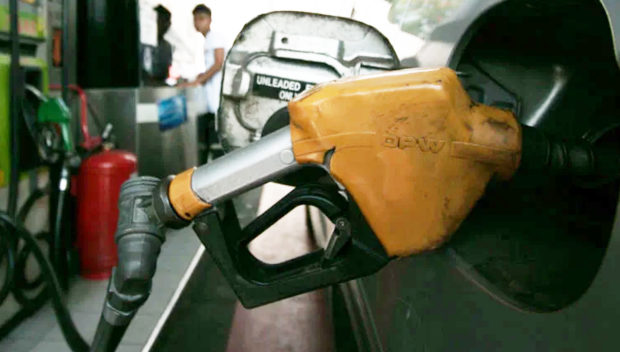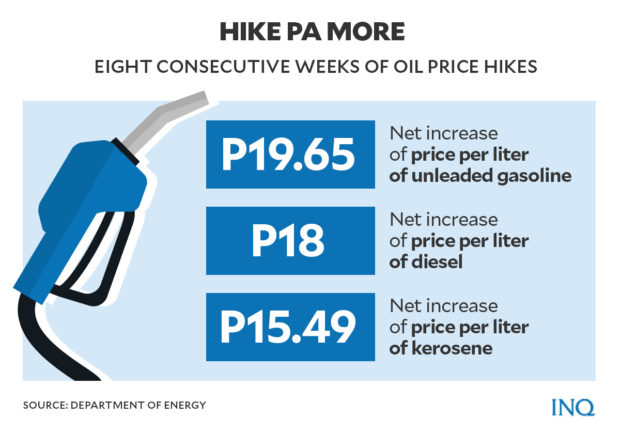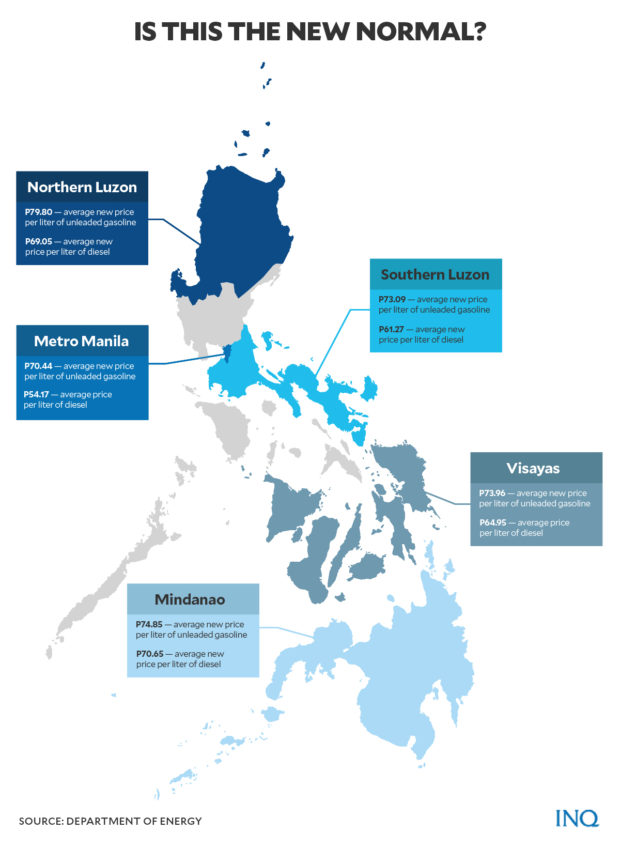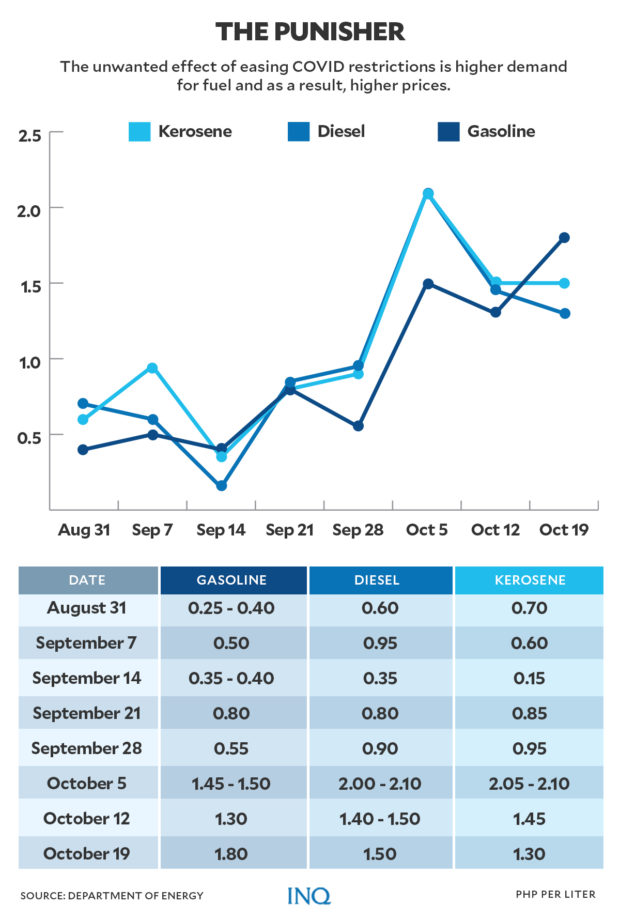8-week oil price hikes hammer Filipinos still being battered by COVID
MANILA, Philippines—The successive increases in oil prices have been explained as a sign of demand returning to pre-pandemic levels which could be a good sign for the economies of the Philippines and other countries.
But for a population that is not yet rising on its feet from pandemic aggravation, increases in oil prices are like salt being rubbed on festering wounds.
More than 3 million people have lost their jobs when lockdowns were enforced this year to control the spread of Delta, a coronavirus variant that is as transmissible as chicken pox. Chicken pox, according to the US Centers for Disease Control and Prevention, has a 10 percent contagion rate which means for every one infected person, at least 10 more were likely to get chicken pox.
Public transport in key Philippine areas is not even in full operation yet and the series of oil price increases were threatening to bury it again.
Public utility vehicle operators and drivers, commuters, consumers, and marginal fishermen were likely to bear the brunt of the string of oil price increases, the latest of which was on Tuesday (Oct. 19).
For the eighth consecutive week, prices of gasoline, diesel, and kerosene increased. This has triggered demands from transport groups, drivers and operators of PUVs for a transport fare hike.
The steep increases in fuel prices may be driven by demand returning to normal but are blind to the continued incapacity of people to spend as a result of pandemic job and income loss.
8-week oil price hike
On Oct. 19, the oil companies increased prices of oil products—P1.80 per liter for gasoline, P1.50 per liter for diesel, and P1.30 per liter for kerosene.
This brought the current retail pump prices of unleaded gasoline and regular diesel in Metro Manila to shoot up to P70.44 per liter and P50.17 per liter respectively.
In Northern Luzon, prices of unleaded gasoline stood at a high of P79.80 per liter and diesel at a high of P69.05. In Southern Luzon, unleaded gasoline costs as much as P73.09 per liter and diesel at P61.27 per liter.
Prices of unleaded gasoline in the Visayas went up to as high as P73.96 and in Mindanao to as high as P74.85 per liter. Diesel in the Visayas cost as much as P64.95 per liter and P70.65 per liter in Mindanao.
Data from the Department of Energy (DOE) showed that the recent oil price hike resulted in a year-to-date adjustment that brought total net price increase per liter of unleaded gasoline to P19.65, P18 for diesel, and P15.49 for kerosene.
There has been no interruption in the weekly price increase since Aug. 31. In total, the increases added up to P7.30 per liter in unleaded gasoline costs and P8.65 per liter in diesel.
What’s driving the increase?
Crude oil prices started to rise in August as energy firms began shutting US production prior to Hurricane Ida’s landfall.
Days following the hurricane landfall, at least 94 percent of US oil production in the Gulf of Mexico, or around 1.7 million barrels per day of crude production, remained offline.
DOE, in its Oct. 5 monitoring, stated that at least 294,414 barrels per day or 16.18 percent of oil production in the Gulf of Mexico and 24.27 percent of gas production remained offline as of Sept. 23—“with full recovery not expected to resume until Q1 2022.”
“Crude oil prices rose steadily on the persistent supply squeeze amid improving global demand and high LNG (liquefied natural gas) and coal prices boosting demand for oil products in meeting energy needs,” the DOE explained in its monitoring report on Oct. 12.
“The rally comes amid China asking its state-owned energy companies to secure energy supplies for upcoming winter ‘at any cost’,” DOE added.
The lack of new plans to increase output by major crude oil producers—like the Organization of Petroleum Exporting Countries, Russia and their allies—amid increasing demand also had an impact on prices.
High oil prices and consumer goods
Prior to the release of the government’s September inflation report last Oct. 5, 13 economists polled by Inquirer forecast that the rate of increase in prices of basic commodities could rise up to 5 percent to 5.2 percent in September.
The economists attributed the expected uptick in prices of food items to the prevailing increase in oil prices as well as supply constraints due to bad weather.
READ: Sept inflation seen accelerating to 5-5.2%
According to the Philippine Statistics Authority (PSA), the country’s inflation rate eased to 4.8 percent in September from 4.9 in August, bringing the country’s average inflation for January to September at 4.5 percent.
Prices of food and non-alcoholic beverages had a slower annual rate of increase—6.2 percent from 6.5 percent in August.
Food likewise slowed down to 6.5 percent in September from 6.9 percent in August. The PSA noted that the figure was still higher compared to the 1.5 percent recorded in September 2020.
PSA noted that while the inflation for the bottom 30 percent income household eased to 5 percent in September from 5.3 percent in August — with average inflation at 4.9 percent since January — it remained higher than the headline rate of 4.5 percent.
Meaning, the poor have paid more for basic goods.
READ: PH inflation slowed to 4.8% in Sept
Pantheon Macroeconomics senior Asia economist Miguel Chanco said the rate of increase in prices of basic commodities could still peak to 6 percent in November.
READ: Inflation seen to get ‘much hotter’ before cooling down by mid-2022
Hurting transport, other sectors
Last week, ahead of the implementation of the oil price hike, transport group Pasang Masda filed a petition for an additional P3 fare on public utility jeepneys (PUJ) — increasing minimum fares from P9 to P12 — to compensate for the skyrocketing fuel prices amid the pandemic.
Other groups, including the Alliance of Concerned Transport Organizations (Acto), Land Transportation Organization of the Philippines (LTOP), Federation of Jeepney Operators and Drivers Association of the Philippines (Fejodap), and Alliance of Transport Operators and Drivers Association of the Philippines Inc. (Altodap), signed the petition.
Jeepney operators and drivers, whose livelihood suffered heavily due to restrictions brought by the COVID-19 pandemic, face heavier burdens due to the rise in fuel costs.
“Our members are complaining. I can see that they are truly struggling. They are still operating at a loss with earnings that are worth only P200,” said Pasang Masda president Obet Martin.
Jeepneys are still allowed to carry only half of their maximum passenger capacity to ensure social distancing among passengers.
On Monday, Oct. 18, the Department of Transportation (DOTr) rejected the P3-fare hike by transport groups. According to Transportation Secretary Arthur Tugade, commuters might not be able to afford a fare increase.
“We understand the situation of our drivers, but we also understand the struggles of our commuters. We know that many of us just got our jobs back. They are still coping, that’s why for us, the fare increase is untimely,” said Tugade.
“Let’s balance the need of drivers and the capabilities of commuters amid the pandemic. So, instead of an across-the-board increase, aid for drivers and commuters will be pushed by DOTr,” he added.
READ: DOTr says no to P3 fare hike sought by Pasang Masda
Martin said that while his group respected Tugade’s decision, the transportation secretary should also consider the needs of drivers.
“We respect his decision to mind the ordinary commuter but we are asking him to heed our plight as well. We drivers are doubly affected by the pandemic as well,” the Pasang Masda president said.
To ease the burden felt by the transport sector, the DOTr and the Land Transportation Franchising and Regulatory Board (LTFRB) have already sent a proposal to the DOE for a uniform discount in all gas stations nationwide for public transport drivers.
“The DOTr and LTFRB wrote to the DOE to give a suggestion on how to alleviate the effect of the continuous oil price hike on PUVs. It includes the provision of fuel subsidy,” said Martin.
The Pambansang Lakas ng Kilusang Mamamalakaya ng Pilipinas (Pamalakaya) — a progressive organization of marginal fishermen— said the “devastating impacts” of big-time oil price hikes were also felt by small fishers.
“This unstoppable skyrocketing oil prices push us to reduce the time we spend for fishing activities,” said Bobby Roldan, Pamalakaya vice chair for Luzon, in a statement on Oct. 4.
“From the regular 6 to 8 hours of fishing in a day, we need to cut it back to 4 to 6 hours because of expensive oil prices,” Roldan said.
“The days we spend in the sea will also be reduced from the usual four to five days to only three days of fishing trip in a week,” he said. “Ultimately, this means further diminution of our already small income and additional days of starvation,” he added.
Roldan, who is a municipal fisherman from Botolan in Zambales, explained that increasing crude oil prices could cost a small fisherman up to P420 for 10 liters of diesel per trip for fishing operations.
This covers at least 80 percent of the entire cost of fishing.
“Because of this, we’d rather lessen our fishing activities because our income is low as it is that it can’t even recover the ever-rising production costs,” said Roldan.
“More often, we have to borrow money to carry out a fishing trip only to return with empty nets and ultimately be buried in debt by loan sharks,” he said.
“The fisherfolk have been already battered with various livelihood crises brought about by the pandemic and successive natural calamities,” Roldan said.
“Instead of providing subsidies and support, the government is openly plotting with big-time oil cartels to further impoverish these struggling sectors,” he added.
TSB


















